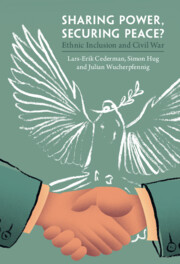Book contents
- Frontmatter
- Contents
- Figures
- Tables
- Preface
- 1 Introduction
- Part I Theories and Concepts
- Part II Analyzing the Effect of Power Sharing on CivilWar
- 4 Power Sharing and Civil War: Data and Baseline Models
- 5 Contrasting Formal Power-Sharing Institutions and Practices
- 6 Endogenizing Governmental Power Sharing and Its Effect on Civil War
- 7 The Strategic Logic of Governmental Power Sharing and Civil War
- 8 The Effect of Territorial and Governmental Power Sharing on Civil War
- 9 The Strategic Logic of Territorial Power Sharing, Secession and Civil War
- Part III Power Sharing and Civil War in Time and Space
- Bibliography
- Index
5 - Contrasting Formal Power-Sharing Institutions and Practices
from Part II - Analyzing the Effect of Power Sharing on CivilWar
Published online by Cambridge University Press: 23 June 2022
- Frontmatter
- Contents
- Figures
- Tables
- Preface
- 1 Introduction
- Part I Theories and Concepts
- Part II Analyzing the Effect of Power Sharing on CivilWar
- 4 Power Sharing and Civil War: Data and Baseline Models
- 5 Contrasting Formal Power-Sharing Institutions and Practices
- 6 Endogenizing Governmental Power Sharing and Its Effect on Civil War
- 7 The Strategic Logic of Governmental Power Sharing and Civil War
- 8 The Effect of Territorial and Governmental Power Sharing on Civil War
- 9 The Strategic Logic of Territorial Power Sharing, Secession and Civil War
- Part III Power Sharing and Civil War in Time and Space
- Bibliography
- Index
Summary
This chapter explores how formal power-sharing institutions relate to power-sharing practices and demonstrates the importance of the latter. Applying causal mediation analysis, we use the Ethnic Power Relations dataset to measure power-sharing practices and the Inclusion Dispersion and Constraints dataset to capture formal power-sharing institutions. The first part of this chapter evaluates whether and why our argument might hold. First, formal power-sharing institutions are not always formally implemented as our analysis clearly demonstrated. Second, in addition to not being implemented, formal power-sharing institutions often fail to result in practices that accommodate ethnic groups. Third, practices that accommodate ethnic groups often emerge even in the absence of formal institutional provisions. These three points highlight that the exclusive institutional focus typically present in existing studies of the effect of power sharing is likely to be misleading. In the second part, we assess more systematically how formal institutions affect the likelihood of conflict onset through practices or other channels. Throughout our analyses, a common theme emerges: If formal institutions affect conflict onset at all, this effect is mainly mediated through power-sharing practices. We find the strongest, mediated effects for formal governmental power-sharing institutions. In contrast, the effects for territorial power sharing are less clear-cut. For governmental power sharing we have also been able to show that the effect of practices on conflict onset depends less on formal power-sharing institutions than on other factors. This result underlines even more forcefully our argument that practices are playing a pivotal role in the link between power sharing and conflict.
- Type
- Chapter
- Information
- Sharing Power, Securing Peace?Ethnic Inclusion and Civil War, pp. 75 - 96Publisher: Cambridge University PressPrint publication year: 2022



